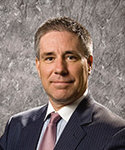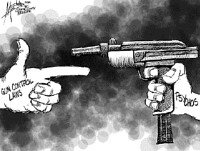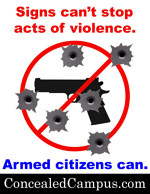

An Honest Liberal Writes about "Gun Control"
![]()
By Daniel J.Mitchell, December 16th, 2012
Article source
 I wrote earlier this month about an honest liberal who acknowledged the problems created by government dependency. Well, it happened again.
I wrote earlier this month about an honest liberal who acknowledged the problems created by government dependency. Well, it happened again.
First, some background.
Like every other decent person, I was horrified and nauseated by the school shootings in Newton, Connecticut.
Part of me wishes the guy hadn't killed himself so that he could be slowly fed into a meat grinder.
And my friends on the left will be happy to know that part of me, when I first learned about the murders, thought the world might be a better place if guns had never been invented.
Sort of like my gut reaction about cigarettes when I find out that somebody I know is dying of a smoking-related illness or how I feel about gambling when I read about a family being ruined because some jerk thought it would be a good idea to use the mortgage money at a casino.
 But there's a reason why it's generally not a good idea to make impulsive decisions based on immediate reactions. In the case of gun control, it can lead to policies that don't work. Or perhaps even make a bad situation worse.
But there's a reason why it's generally not a good idea to make impulsive decisions based on immediate reactions. In the case of gun control, it can lead to policies that don't work. Or perhaps even make a bad situation worse.
I've certainly made these points when writing and pontificating about gun control. But I'm a libertarian, so that's hardly a surprise. We're people who instinctively are skeptical of giving government power over individuals.
But when someone on the left reaches the same conclusion, that's perhaps more significant. Especially when you get the feeling that they would like ban private gun ownership in their version of a perfect world.
That's why I heartily recommend Jeffrey Goldberg's article in The Atlantic.
Here are some of the most profound passages in the article, beginning with a common-sense observation that there's no way for the government to end private gun ownership.
According to a 2011 Gallup poll, 47 percent of American adults keep at least one gun at home or on their property, and many of these gun owners are absolutists opposed to any government regulation of firearms. According to the same poll, only 26 percent of Americans support a ban on handguns. … There are ways, of course, to make it at least marginally more difficult for the criminally minded, for the dangerously mentally ill, and for the suicidal to buy guns and ammunition. … But these gun-control efforts, while noble, would only have a modest impact on the rate of gun violence in America. Why? Because it's too late. There are an estimated 280 million to 300 million guns in private hands in America – many legally owned, many not. Each year, more than 4 million new guns enter the market. … America's level of gun ownership means that even if the Supreme Court – which ruled in 2008 that the Second Amendment gives citizens the individual right to own firearms, as gun advocates have long insisted – suddenly reversed itself and ruled that the individual ownership of handguns was illegal, there would be no practical way for a democratic country to locate and seize those guns.
Which is why prohibition was a flop. Which is why the current War on Drugs is so misguided. And so on and so on.
The author then wonders whether the best way of protecting public safety is to have more gun ownership.
Which raises a question: When even anti-gun activists believe that the debate over private gun ownership is closed; when it is too late to reduce the number of guns in private hands – and since only the naive think that legislation will prevent more than a modest number of the criminally minded, and the mentally deranged, from acquiring a gun in a country absolutely inundated with weapons – could it be that an effective way to combat guns is with more guns? Today, more than 8 million vetted and (depending on the state) trained law-abiding citizens possess state-issued "concealed carry" handgun permits, which allow them to carry a concealed handgun or other weapon in public. Anti-gun activists believe the expansion of concealed-carry permits represents a serious threat to public order. But what if, in fact, the reverse is true? Mightn't allowing more law-abiding private citizens to carry concealed weapons – when combined with other forms of stringent gun regulation – actually reduce gun violence?
He cites examples where armed citizens stopped mass killings.
In 1997, a disturbed high-school student named Luke Woodham stabbed his mother and then shot and killed two people at Pearl High School in Pearl, Mississippi. He then began driving toward a nearby junior high to continue his shooting spree, but the assistant principal of the high school, Joel Myrick, aimed a pistol he kept in his truck at Woodham, causing him to veer off the road. Myrick then put his pistol to Woodham's neck and disarmed him. On January 16, 2002, a disgruntled former student at the Appalachian School of Law in Grundy, Virginia, had killed three people, including the school's dean, when two students, both off-duty law-enforcement officers, retrieved their weapons and pointed them at the shooter, who ended his killing spree and surrendered. In December 2007, a man armed with a semiautomatic rifle and two pistols entered the New Life Church in Colorado Springs and killed two teenage girls before a church member, Jeanne Assam – a former Minneapolis police officer and a volunteer church security guard – shot and wounded the gunman, who then killed himself.
The author also punctures the left's mythology about concealed carry laws.
In 2003, John Gilchrist, the legislative counsel for the Ohio Association of Chiefs of Police, testified, "If 200,000 to 300,000 citizens begin carrying a concealed weapon, common sense tells us that accidents will become a daily event." When I called Gilchrist recently, he told me that events since the state's concealed-carry law took effect have proved his point. … Gilchrist's argument would be convincing but for one thing: the firearm crime rate in Ohio remained steady after the concealed-carry law passed in 2004.
Goldberg elaborates.
Today, the number of concealed-carry permits is the highest it's ever been, at 8 million, and the homicide rate is the lowest it's been in four decades – less than half what it was 20 years ago. (The number of people allowed to carry concealed weapons is actually considerably higher than 8 million, because residents of Vermont, Wyoming, Arizona, Alaska, and parts of Montana do not need government permission to carry their personal firearms. These states have what Second Amendment absolutists refer to as "constitutional carry," meaning, in essence, that the Second Amendment is their permit.) Many gun-rights advocates see a link between an increasingly armed public and a decreasing crime rate. "I think effective law enforcement has had the biggest impact on crime rates, but I think concealed carry has something to do with it. We've seen an explosion in the number of people licensed to carry," Lott told me. "You can deter criminality through longer sentencing, and you deter criminality by making it riskier for people to commit crimes. And one way to make it riskier is to create the impression among the criminal population that the law-abiding citizen they want to target may have a gun." Crime statistics in Britain, where guns are much scarcer, bear this out. Gary Kleck, a criminologist at Florida State University, wrote in his 1991 book, Point Blank: Guns and Violence in America, that only 13 percent of burglaries in America occur when the occupant is home. In Britain, so-called hot burglaries account for about 45 percent of all break-ins. Kleck and others attribute America's low rate of occupied-home burglaries to fear among criminals that homeowners might be armed. (A survey of almost 2,000 convicted U.S. felons, conducted by the criminologists Peter Rossi and James D. Wright in the late '80s, concluded that burglars are more afraid of armed homeowners than they are of arrest by the police.)
That last bit of info is very powerful. The bad guys are more afraid of armed homeowners than the police. Surely, as I explained here, that tells us that gun ownership lowers crime.
Here's another no-nonsense-Sherlock observation from the article.
It is also illogical for campuses to advertise themselves as "gun-free." Someone bent on murder is not usually dissuaded by posted anti-gun regulations. Quite the opposite – publicly describing your property as gun-free is analogous to posting a notice on your front door saying your home has no burglar alarm. As it happens, the company that owns the Century 16 Cineplex in Aurora had declared the property a gun-free zone.
 I recently mocked the idea of gun-free zones with several amusing posters. It's unbelievable that some people think that killers care about such rules.
I recently mocked the idea of gun-free zones with several amusing posters. It's unbelievable that some people think that killers care about such rules.
(add-no-guns-special) One place that isn't likely to see any massacres is Colorado State University.
For much of the population of a typical campus, concealed-carry permitting is not an issue. Most states that issue permits will grant them only to people who are at least 21 years old. But the crime-rate statistics at universities that do allow permit holders on campus with their weapons are instructive. An hour north of Boulder, in Fort Collins, sits Colorado State University. Concealed carry has been allowed at CSU since 2003, and according to James Alderden, the former sheriff of Larimer County, which encompasses Fort Collins, violent crime at Colorado State has dropped since then.
I also recommend this video, which makes fun of those who support gun-free zones.
Here is Goldberg's conclusion.
But I am sympathetic to the idea of armed self-defense, because it does often work, because encouraging learned helplessness is morally corrupt, and because, however much I might wish it, the United States is not going to become Canada. Guns are with us, whether we like it or not. Maybe this is tragic, but it is also reality. So Americans who are qualified to possess firearms shouldn't be denied the right to participate in their own defense. And it is empirically true that the great majority of America's tens of millions of law-abiding gun owners have not created chaos in society.
Goldberg's article, by the way, doesn't even mention the value of private gun ownership when government fails to maintain public order, as occurred after Hurricane Sandy and during last year's British riots.
I have a couple of final things to share, including this video about a woman who lost her parents because she decided to obey a bad government law. And here's a great study from Cato about individuals using guns to protect themselves.
![]()



































